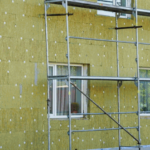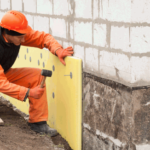Are you tired of dealing with pesky clogged drains in your home?
We explore the different types of drain unblockers available, including chemical, mechanical, and natural options.
Discover if you can use a drain unblocker on a toilet, the risks, and alternatives.
Get tips on preventing toilet clogs and knowing when to call a professional plumber.
Learn how to keep your drains flowing smoothly!
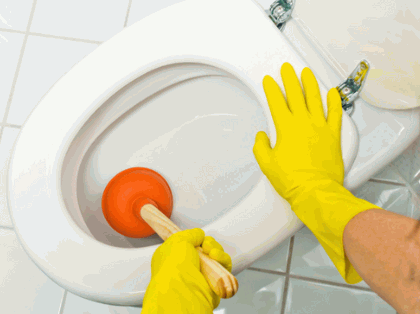
What Is A Drain Unblocker?
A drain unblocker is a product or tool designed to remove obstructions or blockages in pipes, specifically in toilets or drains.
These blockages can occur due to a buildup of hair, soap scum, grease, food particles, or even mineral deposits, causing a clog that restricts the flow of water. A drain unblocker works by breaking down these substances and clearing the pathway, allowing water to flow freely again. It is a cost-effective and efficient solution for dealing with common plumbing issues without the need for professional assistance. Whether it’s a slow-draining sink or a completely blocked toilet, a drain unblocker can often provide a quick and easy fix.
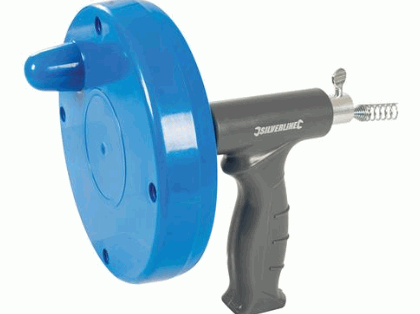
What Are The Types Of Drain Unblockers?
There are three main types of drain unblockers: chemical, mechanical, and natural solutions, each offering different approaches to clearing blockages.
Chemical drain unblockers typically contain powerful ingredients like sulfuric acid or sodium hydroxide, which work by breaking down greasy clogs and organic matter. While they are efficient in clearing tough blockages, caution should be exercised when handling them due to their corrosive nature.
On the other hand, mechanical unblockers, such as drain snakes or augers, physically remove obstructions by either pushing or pulling them out. These tools are versatile and can tackle a wide range of blockages without the use of harsh chemicals.
Natural drain unblockers, like enzyme-based products or homemade mixtures, provide a gentler approach that is safer for the environment and septic systems. These products utilize bio-friendly enzymes or natural acids to break down blockages effectively.
Chemical Drain Unblockers
Chemical drain unblockers are liquid solutions that utilize chemical reactions to dissolve clogs in pipes, but they can emit toxic fumes and pose risks if not used carefully.
These unblockers typically work by generating heat to melt away the substances causing blockages in drains, allowing water to flow freely again. Users need to be cautious as the chemicals in these products can be corrosive and harmful if mishandled or if they come into contact with skin or eyes.
It’s important to wear protective gear like gloves and goggles when using these drain cleaners to prevent any accidental exposure. In addition, proper ventilation is crucial to avoid inhaling the noxious vapors that these solutions release during the clearing process.
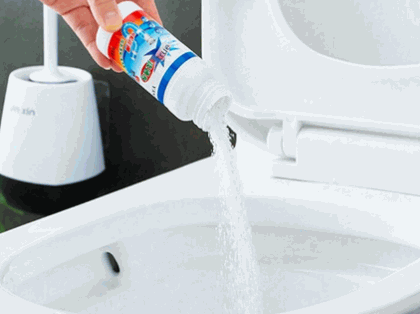
Mechanical Drain Unblockers
Mechanical drain unblockers such as plungers or plumbing snakes physically dislodge clogs, making them effective for removing blockages caused by hair build-up or debris.
Plungers are a popular choice for dealing with minor clogs in toilets or sinks. By creating pressure and suction, plungers can often clear blockages without the need for harsh chemicals. On the other hand, plumbing snakes, also known as augers, are more versatile tools that can reach deep into pipes to break up tougher clogs like tree roots or mineral deposits.
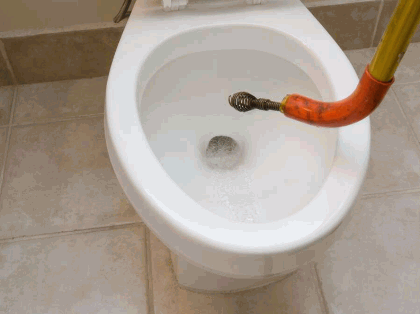
Natural Drain Unblockers
Natural drain unblockers like vinegar, baking soda, or enzyme-based solutions offer eco-friendly alternatives for clearing clogs without harsh chemicals.
These eco-friendly methods not only effectively break down blockages but also help prevent future clogs from forming. Vinegar, known for its acidic properties, can dissolve organic materials while baking soda works to scrub away debris and odors. Enzyme-based solutions introduce beneficial bacteria that actively break down fats, oils, and other buildup in pipes, without harming the environment. What sets these natural drain unblockers apart is their ability to tackle stubborn clogs while being gentle on pipes, making them a safe and sustainable choice for maintaining a healthy plumbing system.
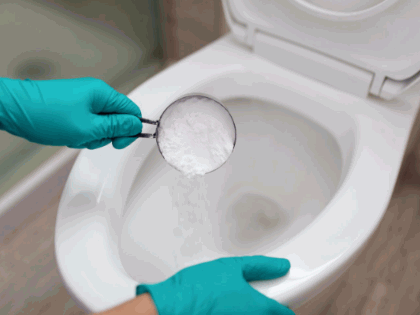
Can You Use Drain Unblocker On A Toilet?
Using a drain unblocker on a toilet is possible, but it comes with certain risks and considerations that need to be addressed.
While drain unblockers can be an effective solution for tackling stubborn clogs in toilets, they often contain harsh chemicals that can be harmful to both your plumbing system and the environment. Caution should be exercised when using these products, as prolonged exposure to these chemicals may lead to pipe corrosion and damage.
The fumes emitted by drain unblockers can be hazardous if not used in a well-ventilated area. It is essential to follow the manufacturer’s instructions carefully to prevent any accidents or mishaps.
Fortunately, there are alternative methods to unclog a toilet that are safer and more eco-friendly. Natural remedies such as using a plunger or a plumbing snake are effective in most cases and do not pose the same risks as chemical-based drain unblockers.
What Are the Risks Of Using Drain Unblockers On A Toilet?
The risks of using a drain unblocker on a toilet include exposure to toxic fumes, damage to plumbing pipes, and potential chemical burns if not handled properly.
When drain unblockers are used in a toilet, the chemicals present in these unclogging agents can release harmful fumes upon contact with water. Inhaling these toxic vapors can lead to respiratory issues and irritation. The corrosive nature of these substances poses a significant danger to the plumbing system, potentially causing irreversible damage to the pipes.
It is crucial to exercise caution while handling drain unblockers, as direct skin contact can result in painful chemical burns. As a safety precaution, always wear protective gear such as gloves and goggles when using these products, and ensure proper ventilation in the area to minimize exposure to noxious gases.
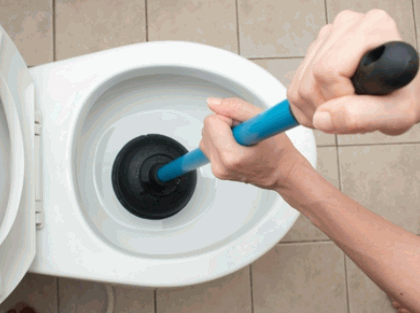
What Are The Alternatives To Using Drain Unblocker On A Toilet?
Alternatives to using a drain unblocker on a toilet include calling a professional plumber, utilizing natural home remedies like vinegar and baking soda, or employing mechanical tools such as plungers.
When facing a stubborn clog in your toilet, sometimes it’s best to leave the job to the experts. Professional plumbers are equipped with the knowledge and tools to efficiently tackle even the most challenging blockages, ensuring a thorough and lasting solution.
For those who prefer a more hands-on approach, DIY solutions offer a cost-effective and environmentally friendly way to unclog a toilet. Simple ingredients like vinegar and baking soda can work wonders in breaking down blockages and clearing the drain.
Alternatively, mechanical tools like plungers are a classic choice for tackling toilet clogs. Their suction power can often dislodge blockages and restore proper drainage without the need for harsh chemicals.
Dig deeper: What Is The Best Drain Cleaning Method
How To Prevent Toilet Clogs?
Preventing toilet clogs involves regular maintenance, avoiding flushing certain items, using a plunger when needed, and trying homemade drain unblockers for minor issues.
Regular maintenance is crucial in keeping your toilet clog-free. Check for any leaks, loose bolts, or signs of wear and tear that could lead to blockages. Also, ensure that the water level in the tank is appropriate for efficient flushing. Remember not to flush items like wipes, sanitary products, or excessive toilet paper down the toilet, as they can easily cause clogs.
When faced with a stubborn blockage, reach for your trusty plunger. Make sure to use quick, firm plunges to create enough pressure to dislodge the clog. If the plunger doesn’t do the trick, consider trying a homemade drain cleaner. A mixture of baking soda and vinegar can often break down minor clogs effectively.
Regular Maintenance
Regular maintenance of toilets is crucial for preventing clogs and maintaining the proper functioning of plumbing systems.
By incorporating routine cleaning practices into your household chores, you can help avoid the inconvenience and potentially costly repairs associated with clogged toilets.
Simple actions such as using a plunger when needed, regularly checking for any leaks, and ensuring that only suitable items are flushed down the toilet play a significant role in the overall health of your plumbing system.
Preventive maintenance helps in identifying issues early on, allowing for timely repair or replacement, ultimately saving you time and money in the long run.
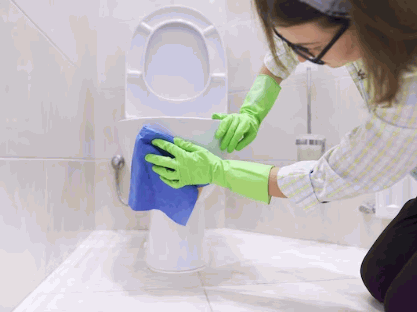
Avoid Flushing Certain Items
To avoid toilet clogs, refrain from flushing items like wipes, sanitary products, paper towels, or bulky materials that can obstruct the drain.
These items are not designed to break down easily in water, making them prone to causing blockages in pipes and sewage systems. When flushed, wipes and sanitary products can accumulate along with grease and other debris, creating stubborn clogs that are challenging to clear.
Instead, it is recommended to dispose of such items in trash bins to prevent plumbing issues. The responsible disposal of these products not only helps in maintaining proper sewage flow but also reduces the risk of costly repairs and environmental harm.
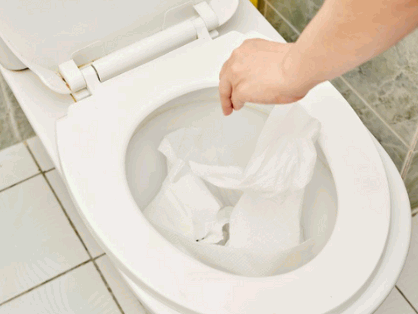
Use A Plunger
A plunger is an effective tool for clearing minor toilet clogs by creating pressure to dislodge blockages within the drain.
Using a plunger correctly can save you from the inconvenience of a clogged toilet. Plungers work by forming a tight seal around the drain opening and then pushing and pulling to create a surge of pressure that helps to break up the obstruction. It is important to ensure that the plunger cup is fully submerged in water to maximize suction. A few vigorous plunges followed by slowly releasing the pressure can often dislodge the clog and restore proper water flow in the toilet.
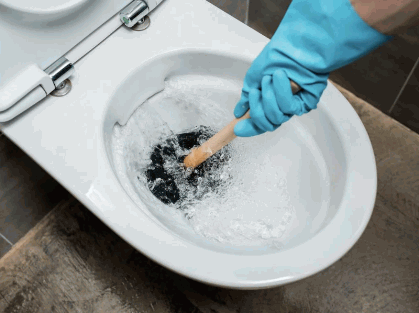
Try A Homemade Drain Unblocker
Homemade drain unblockers using ingredients like vinegar and baking soda offer eco-friendly solutions for minor clogs without the use of harsh chemicals.
These DIY solutions are not only gentle on the environment but also on your plumbing system. The combination of vinegar’s acidity and baking soda’s abrasive properties creates a fizzing reaction that can help break down debris in your pipes. The lack of harsh chemicals means you can use these homemade unblockers without worrying about damaging your pipes or harming aquatic life when the solution eventually makes its way into water systems.
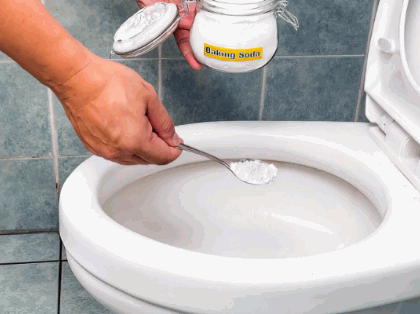
When To Call A Professional Plumber?
Calling a professional plumber is advisable for severe toilet clogs, issues with the sewage line, or persistent blockages that cannot be resolved with DIY methods.
These situations often signal complex underlying problems that require the expertise of a seasoned plumber. Professionals have the necessary training, tools, and experience to diagnose the root cause of the issue efficiently. By entrusting the job to a qualified plumber, you can avoid making the problem worse or causing additional damage.
Timely intervention is crucial in such cases to prevent water damage, mold growth, or potential health hazards. Trying to tackle serious plumbing issues without the right knowledge may lead to costly repairs in the future.
Conclusion
Maintaining toilet hygiene, adopting preventive measures, and knowing when to seek professional help are key aspects of dealing with toilet clogs effectively.
Regularly maintaining your toilet not only ensures a clean and hygienic environment but also helps in detecting early signs of potential clogs. Simple preventive actions like using a hair catcher in showers, avoiding flushing non-soluble items, and periodic inspections can go a long way in preventing blockages.
Despite best efforts, clogs can still occur due to various factors such as aging pipes or foreign objects stuck in the plumbing system. This is where knowledgeable professional plumbers play a crucial role. They have the expertise to diagnose the root cause of the clog, use specialized tools to clear the blockage effectively and provide long-term solutions to prevent future occurrences.
Trusting skilled plumbers for complex toilet clogs not only saves time and effort but also ensures that the issue is resolved correctly to avoid recurrent problems.
